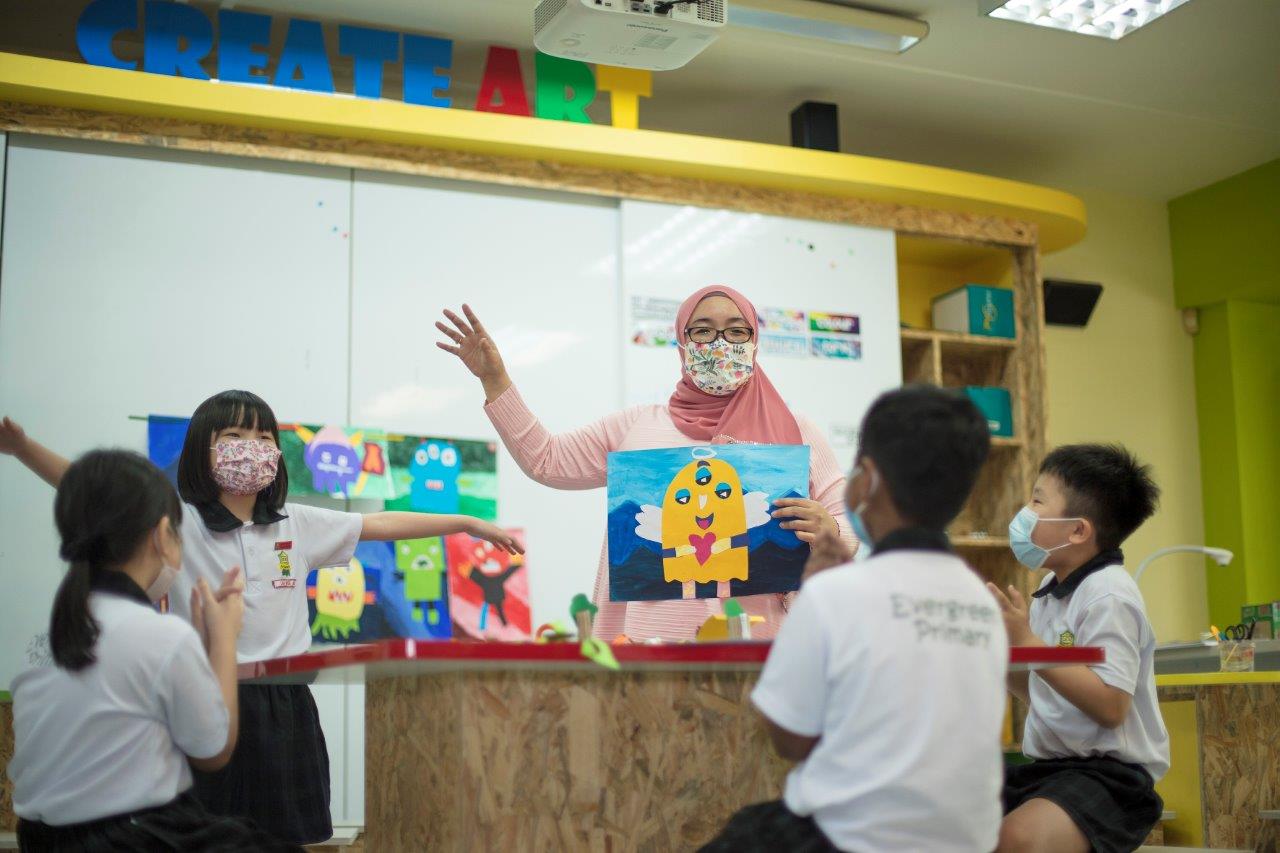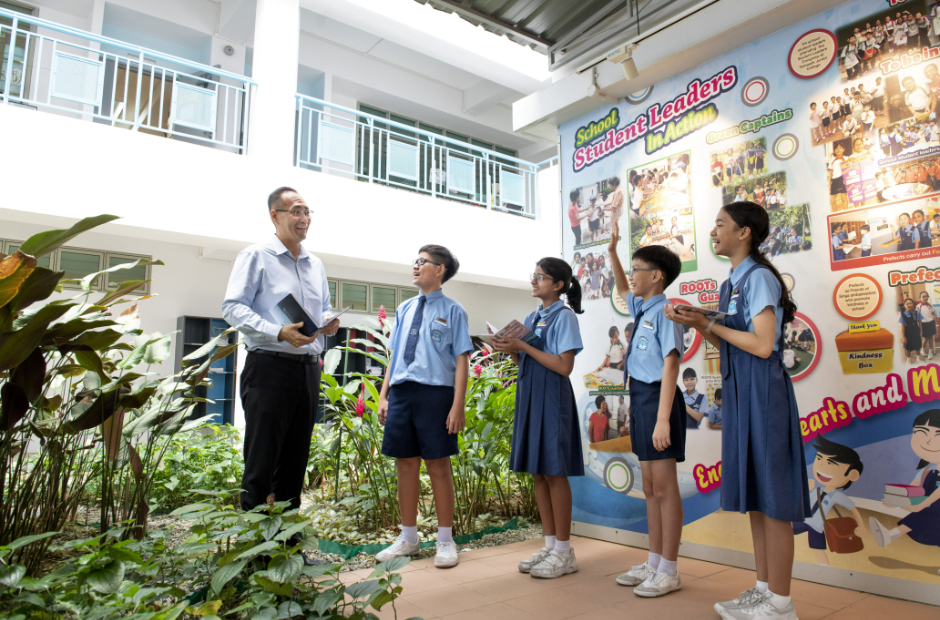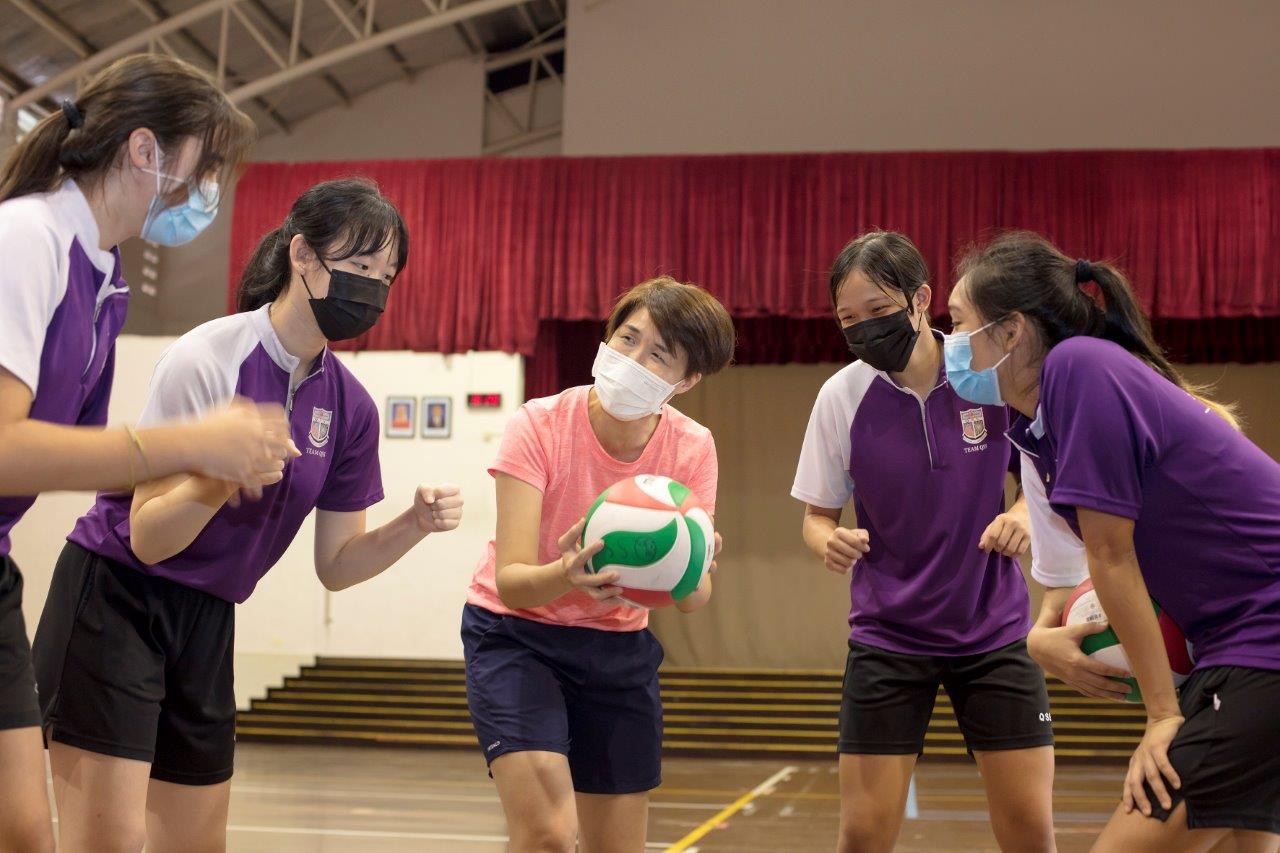Radin Rafeah Binte Ali, Evergreen Primary School, President’s Award for Teachers 2021 Finalist
Radin Rafeah Binte Ali remembers her primary school days well, when she was battling self-esteem issues which affected her studies. It took a teacher to shine a light on what seemed like dark clouds ahead.
“My Primary 5 form teacher Mrs Khoo, who was also my Art teacher, saw my passion in Art,” said Radin “She helped me in my studies, and she also encouraged me to take part in art competitions in school.” The results were lifechanging for Radin, who is today the Head of Department (HOD) of Aesthetics & Special Projects at Evergreen Primary School.
“When I started winning at the competitions, I finally felt I was good at something,” shared Radin. “That motivated me to study very hard and I got a decent score for PSLE.” She would later graduate from the National University of Singapore with a degree in statistics.
Art as a springboard
Art was the springboard to her newfound confidence in life, so when Radin became an educator, she held on fast to the belief that art can change lives.
This belief is evident in Evergreen Primary where Radin has taught for 14 years. Setting foot into the school, one can sense the buzz of vibrancy in the air with various Art-related activities taking place. At first glance, they seem like regular art lessons that impart art knowledge, techniques and skills. However, Radin ensures that they have been infused with topics on environmental and social issues. These issues seek to prompt a response from students that engender the values of respect, responsibility, integrity and empathy.
“There is always a larger outcome that I try to infuse in their learning,” Radin explained. “I don’t want Art to just be another subject and for them to go away thinking that there is no use for it in real life.”
For example, while modelling clay into plant plots with Primary 4 students, Radin takes the opportunity to explain to them the Singapore Green Plan 2030 which aims to secure a green, liveable and sustainable home for Singaporeans. They learnt the importance of how greening their own homes with their handmade clay pots could contribute to the nation’s sustainability efforts.
Another lesson conducted during the home-based learning (HBL) period, involved creating toys from materials found readily in their homes to teach students the importance of recycling. Subsequently, students posted videos of their upcycled creations on Padlet and showcased their toy designs. Radin was particularly impressed by a soccer game which showed resourcefulness in using different materials whilst incorporating the scientific principle of tension by using a rubber band to launch a soccer ball.
Her philosophy towards teaching is very much focused on giving students autonomy in their learning. For example, when students had to learn from home during the COVID-19 pandemic in 2020, the Art teachers piloted a programme whereby Primary 3 students could choose one of three assignments to do. The assignments ranged from easy to challenging. The teachers did not influence the students’ choices, except to nudge them along on a progressive path.
“We want them to have the opportunity to go back to it and try to see if we can move up to the next level,” she said. “If they have decided on the task with the lowest difficulty level, they can challenge themselves to go further the next time.”
When more confident students choose challenging assignments and complete them, they are encouraged to advance their learning by researching on the topic in depth, applying skills and knowledge in other works, or guiding their peers via face-to-face interactions when possible.
By providing students with more autonomy, it encourages them to be more committed to the project and builds their confidence in the process, said Radin.
Where everyone is respected
Radin sees the benefits of breaking down walls, and spearheaded various initiatives among the teaching staff to encourage a healthy exchange of ideas and experiences. She introduced the ‘open classroom’ concept, where any teacher can sit in on her lessons to borrow techniques and strategies for their own use.
She facilitates and encourages collaborative learning among her teachers where they come together to discuss and create interesting lesson plans, share learning points, tweak and improve lessons. She has also conducted art workshops where teachers can come together to learn something new.
For the students, Radin leads the school’s signature Multi Modal Programme (MMP), where all students spend about 90 minutes every week during curriculum time on activities outside of their schoolwork and CCAs. These could be anything from fencing, self-management and life skills, to financial literacy – Radin and her team refresh the activities periodically to keep things relevant and interesting for the students, who take part in the MMP from Primary 1 to 6.
MMP, which is into its fourth year, was conceptualised and planned with the aim to uplift all students through raising their self-confidence and self-efficacy by helping them uncover their innate strengths and talents and building on their interests through varied experiences. Students are given choice and voice, and encouraged to express themselves, make mistakes, and go out of their comfort zones. It provides a “safe environment” for students to learn through play.
Each module runs for a term of 8 weeks. Students collaborate to realise a shared intended outcome; either a showcase of what the students had learnt or they teach the other levels of students what they had learnt. Everyone has a part to play, and every contribution is celebrated regardless of their readiness levels or talents.
MMP is an inclusive programme. All students including those with special needs are given the opportunity to enjoy learning and experience success. Tasks and roles are sometimes differentiated. For example, in drama modules, special needs students might be given the easier roles, however, they also take centre stage during performances. Said Radin, “Everyone is valued by the school. Dignity and respect are accorded to every student.”
Going the extra mile
Taking a leaf from the teachers of her youth, Radin thinks nothing of going the extra mile to help a student in need. In fact, she values every opportunity to do so.
She laughed, recalling how one student repeatedly nominated her for the Caring Teacher Award, even after she had left Evergreen Primary School. Then there was a rebellious 12-year-old who was often troubled and did not hand in her homework regularly. This all led to poor academic results. Radin would check in with her and tutor her after school. She also encouraged her to keep a journal and express her emotions through art. Together with other forms of counselling, the student became better at managing her emotions and her performance at school improved.
Radin feels that paying it forward is the natural thing to do. “Because my teachers believed in me and gave me so many opportunities, I want to be that someone who believes in my students and give them the confidence and opportunity to succeed in life.”







